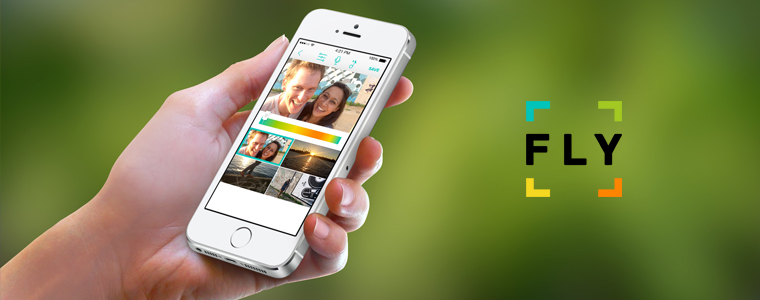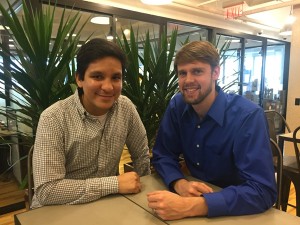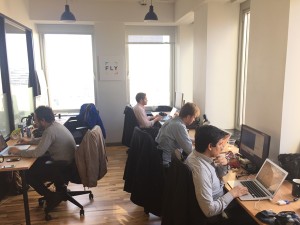Made by coworking: Fly Labs video editing apps

by Kelly Baug
App company Fly Labs, named by Business Insider as one of the “25 Hot NYC Startups You Need To Watch,” is bringing instant video editing to your fingertips. The maker of “the world’s simplest video editor” has developed a suite of apps for the iPhone and iPad that allows the amateur videographer to intuitively arrange, trim, and combine clips to craft a powerful final cut.
Fly Labs is led by Tim Novikoff, an actor, teacher, iOS developer and entrepreneur from New York City. The company released Fly, the first of Fly Lab’s apps, in July 2014.
After getting a BA in both theater and math from New York University, Novikoff received a PhD in Applied Sciences from Cornell University in Ithaca, New York. At Cornell he also created, and continues to teach, the first introductory and intermediate courses in iPhone app development in the computer sciences department.
The idea for Fly came to Novikoff while setting up for a Halloween party in 2011. He and a few friends had decided to put together a band to play Queen’s classic “Don’t Stop Me Now” at the gig that night. As he set up the decorations, while appropriately dressed as Freddie Mercury, he began to think that since everyone at the party would have a smartphone with them it would be cool to be able to create a single, multi-angle video of the performance.
He soon realized that this would pose an enormous challenge. People at the party would have to set up each of their own devices, hit record at the same time, and then somehow send him the files so that he could then import them into Final Cut Pro or iMovie.
“I just wanted to be able to watch a bunch of videos simultaneously and be like, cut to camera three, cut to camera four.”
Novikoff never did make a video of that Halloween party. However, a week later he took the idea to 3 Day Startup, an interdisciplinary entrepreneurial program that operates in sixty universities around the world. Students come in with ideas for startup companies, then pool their ideas, vote on five or six of them, and hopefully leave with the beginnings of a business model.
In the next few weeks Novikoff and his group fleshed out a prototype and brought it to DreamIt Ventures, an incubator in New York City. DreamIt gave the team five thousand dollars (along with a table and some chairs) to finance their project during the summer of 2012, but at the end of the season they hadn’t gotten far.
“I was kind of left adrift, thinking, all right, should I finish this, should I keep going, or not?” said Novikoff.
This is when coworking spaces first came into play for him. A brand new coworking space, AlleyNYC, opened its doors for the first time just as Novikoff’s time at the incubator was wrapping up. As AlleyNYC built up their client base they allowed Novikoff to squat for free. He eventually became a member as he began putting a new team together.

Tim Novikoff, founder of Fly Labs, right, with Fernado Irías, left.
Enter Fernando Irías. The web developer, born and raised in Tegucigalpa, Honduras, received a bachelor’s degree in Computer Engineering in 2010 from the main technology university in Honduras, UNITEC. While pursuing his degree he also studied abroad at National Tsing Hua University in Hsinchu, Taiwan, taking a short course in Web Technologies.
After his return to Honduras from Taiwan, Irías began working on a startup, Class.io, with a fellow classmate and one of their lecturers. As a web-based communication platform, Class.io helps teachers share resources with students. This was the first of many startups that Irías has been involved with over the past few years, though he says that Fly Labs is “the latest and most promising one.”
Irías and Novikoff met at the 2012 DreamIt Ventures program. The pair became friends and “beta testers” of each other’s projects.
“I was really impressed by the technology Tim and their team were building during the summer,” said Irías. At the end of the program he returned to his native Honduras. Soon after Fernando arrived back in Honduras, Novikoff emailed Irías to see if he would be able to start working on Fly.
“I said yes. And it didn’t take long for me to fall in love with everything happening behind the scenes on the technical side,” said Irías.
They began working remotely, Novikoff at AlleyNYC, Irías at his home in Honduras. Their Google Hangouts often stretched into hours-long sessions.
“Even though it was a real challenge to have these daily Google Hangouts due to technical difficulties, they really helped to build a great working relationship between us both. It also helped me gain a lot of trust in his leadership,” Irías said of Novikoff.
When the company was eventually funded in January 2013, Novikoff sponsored Irías for an H1B visa which allowed him to come to New York and become an employee of the company. In September they found out that the visa application had been approved, and Irías readied himself to make the move.
Since then, the two have been working with the rest of the team stateside. Novikoff moved the team to some extra office space provided by Refinery29, the mega-popular web-based fashion magazine, citing that they had found “a friendly company that would give us office space for cheap.” They stayed with Refinery29 for about nine months, but as their host grew to employ over 200 people of their own, Novikoff knew he would have to find a new space once again.

Fly Labs’ office at WeWork.
Luckily, a branch of WeWork waited just across the street. The Fly Labs team now works out of an office there, which Irías says “allow[s] us to focus more on getting things done and also is a place we feel [is] our own.”
“Last October we were in a six-person office and a month later we upgraded to a nine-person office, so it also provides the flexibility we require as our startup grows. Even though we have the advantages of a more private setting, it is still very easy to interact with other startups around the office,” said Irías.
Fly Labs prides itself on being user-friendly. “It’s used by different people for different reasons. There are kids who use the apps, grandmothers who use the apps. We actually get these hilarious emails from grandmas who have actually mastered everything and just can’t figure out one thing,” says Novikoff. When asked who is most likely to use the app, he says, “We have a huge cross-section demographically. Anybody can make a video.”
Currently, Fly Labs offers three different apps in their suite: Fly, a platform for users to record and craft their own videos; Clips, “the simplest video editor in the world” that allows users to string together multiple clips into a single video; and Crop, “the cure for vertical video syndrome.”
“We basically think about apps that will allow people to put together videos to make better and more full videos. Fly and Clips are good examples of apps like that, where you can combine videos, combine shots or clips, into one longer montage. And we also think about apps that could make one shot better. So right now we’re thinking a lot about slow-motion and how can we enable people to get creative with slow-motion. So you will see something in slow-motion coming out in early 2015, for sure,” said Novikoff.
The latest version of Clips will be available soon and will support slow-motion video.
For more on companies, organizations and projects created by people who cowork, check out our series Made by Coworking.
Photo credit: Photos courtesy of Fly Labs
No comments yet.